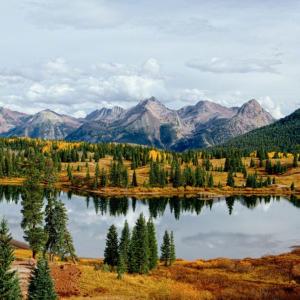When
Rapid Ecological Change & Transformation Across the Middle and Southern Rockies During a Previous Climate Warming
Presented by:
SHELLEY CRAUSBAY
US Forest Service
ABSTRACT:
How did rapid ecological change and transformation in the Middle and Southern Rockies unfold during a previous, dramatic climate warming? Answering this question could help resource managers better prepare for such phenomena in the future. We leveraged the Neotoma Paleoecology Database to develop the record of landscape-scale rapid ecological change and transformation of vegetation over the last 21,000 years in the Middle and Southern Rockies ecoregions. We modeled the climate drivers of rapid vegetation change and transformation at the landscape scale with TRacE21ka paleoclimate output in Boosted Regression Trees, and we modeled the role of landscape characteristics at the site-level with a Bayesian approach. We identified 60 unique transformations across all 29 sites that took 21 different forms. We found that, at the landscape scale, a 2 ℃ rise in temperature initiated rapid ecological change, and a 5 ℃ rise led to ecological transformation. We also found that landscape characteristics played only a minor role in climate-driven vegetation change, with somewhat faster change on southwest-facing slopes in the Southern Rockies. In addition, transition out of any one particular vegetation type generally resulted in a diverse array of ecological trajectories and outcomes across sites, suggesting that managers would benefit from considering multiple potential ecological futures in climate adaptation planning. This study shows that rapid warming, to the degree expected within the next few decades in the Southern and Middle Rockies, can trigger landscape-scale ecological changes, regardless of the landscape context.
About the speaker:
Shelley Crausbay, Ph.D., is currently a Climate Adaptation Specialist for the US Forest Service, and was formerly a Consortium Partner of the North Central Climate Adaptation Science Center. Shelley is trained as a plant community ecologist and paleoecologist, with experience in climatology. She has worked across diverse geographies, from the western US, to Southeast Asia, the Caribbean, and Hawaiʻi. Her work focuses on understanding triggers of ecological state changes, climate drivers of vegetation dynamics, and the role of disturbance in a changing climate context. Shelley is most interested in linking science to action and she uses ecological models and science synthesis to foster proactive management strategies that address ecological responses to our swiftly changing environment. She received her Ph.D. in Botany from the University of Wisconsin and her M.S. in Plant Biology from the University of Minnesota.


